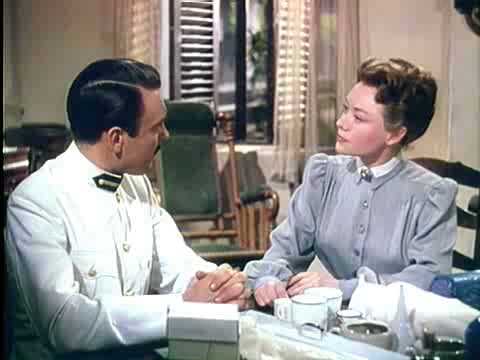

One can almost see the wheels turning in the ancient and esteemed British production company, The Rank Organization, the interoffice muttering that leads to inter-office memos and then to major — or minor — motion pictures.
“Oy! What’s this? United Artists has a big, fat hit on its hands with ‘The African Queen?’ What have we got the rights to, that story that predates the (C.S. Forester) novel that one came from?”
That would be “The Beachcomber (The Vessel of Wrath),” which had already been made into a British film back in 1938. Somerset Maugham published the story, about a tipsy but sturdy man of the tropics named “The Honorable Ted,” and the sparks he set off with the willful and pious spinster missionary lady — a teetotaler — and their life-and-death “tests” in the “uncivilized” world, back in 1931.
Forester’s novel about a jungle river adventure involving a tipsy but sturdy riverboat skipper of the tropics named Charlie Allnutt, and the willful and pious spinster missionary — also a teetotaler — was published in 1935.
No, they’re not the same. But…
The most famous version of “The Beachcomber” starred Charles Laughton and Elsa Lanchester. But the 1954 version, with Robert Newton, Glynis Johns and others, was in glorious Technicolor, reason enough to check it out whilst scrolling the “classics” menu of assorted streamers.
It’s dated, sexist, racially patronizing and downright cringe-worthy at times. But one of the few British women directors of the day was behind the camera. And where else can you find a future Bond villain and “Halloween” hero in blackface?
Donald Sinden plays Gray, the aristocratic young man sent to be the new “Resident,” the crown’s governor, on a Raj-era island somewhere in the Indian Ocean (Sri Lanka, then called “Ceylon,” was where the exteriors were filmed). He is warned that his predecessor in the job “shot himself.” But it’s too late to turn back now.
Gray meets his head clerk, Tromp (Donald Pleasance, the first Anglo actor in blackface here, and not the last), and the priggish local pastor (Paul Rogers) and medical man, and his equally priggish sister (Glynis Johns).
Gray barks out orders in that pidgin English so popular during The Raj, or at least in movies about The Raj. And he hears his first words of warning about the only other countryman on this island of Barru, “The Honorable Ted.” It isn’t long before the tatty, tipsy Ted (Newton, the definitive “Long John Silver”) makes his introductions.
After a meal with the missionaries, who “take only water,” Ted figures Grey needs “a proper welcome from the white population” of the place. He proceeds to drink the man’s liquor, confess that he earns the family stipend “by staying out of England,” and make an offer that “any time you feel like a little bit of fun” to the young, crisp-uniformed bureaucrat.
Before you can say “Pip pip” Ted is stirring up pith-helmeted officialdom with his dissolute ways, busting up a bar after corrupting a local “girl” half or even one-third his age.
Oh yes, that’s cringe-worthy. Every scene with some native beauty hanging all over the pasty-sweaty Newton might have been worth a laugh back then, but more stern condemnation today, “consent” or not.
Fear not! Ted’s reckoning is coming, foretold by the missionary and delivered, as justice, by the new “resident” after many Ted transgressions. The locals marvel that “a white man” faces the same justice they do, months of hard labor, for busting up a bar.
The heart of the story here is the mutual contempt shared by Ted and Sister Martha, and the ways that iciness melts. No, it’s not terribly convincing as a plot point, but the screenwriter — director Muriel Box’s husband, Sydney — did the best he could with what he had to work with.
There are some splendid outdoor scenes — a crocodile attack, natives managing their boats, an elephant as pack mule and major plot point.
The picture clocks in at a brisk 82 minutes. That leaves just enough time for the viewer to figure out who in the cast is a native of India or Ceylon or Asia, and where you’ve seen the blackfaced Pleasance (“The Great Escape,” as Blofeld in “You Only Live Twice” and the doctor hunting his worst patient in “Halloween”) or the plummy-voiced and blackfaced Michael Hordern (“Gandhi,” “The Missionary,” “Lady Jane” and one of the most beloved narrators of his day) before.
It’s a curiosity, and an artifact of a seriously tone-deaf era in cinema when it comes to race. And truth be told, aside from the drunk scenes, there’s not a lot of lightheartedness to it.
But “Beachcomber” is worth catching for Newton and Johns’ performances, for the action beats and for the cringyness of it all, a film that reminds us of the way no one British questioned British colonialism — at least not in the movies — for a very long time, and that blackface didn’t truly disappear until after Alec Guinness had one more go of it in “A Passage to India,” some 30 years after “The Beachcomber” tried to cash in on its “African Queen” appeal.
Rating: Approved, violence, lots of drinking, smoking
Cast: Robert Newton, Glynis Johns, Donald Sinden, Paul Rogers, Donald Pleasance, Auric Lorand and Michael Hordern
Credits: Directed by Muriel Box, scripted by Sydney Box. A Rank Organization release, on Tubi, Amazon, etc.
Running time: 1:22

